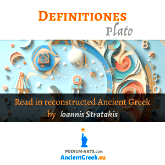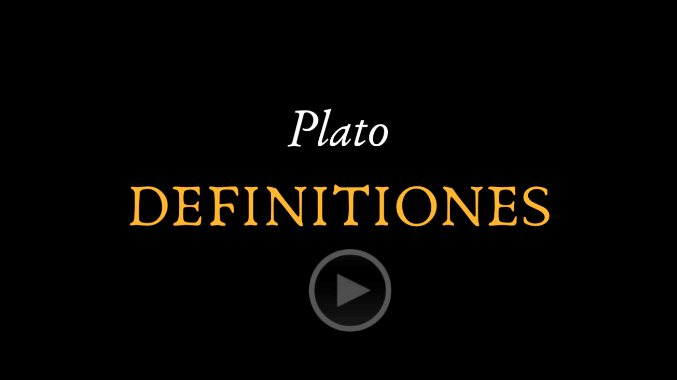• Definitions •
• Plato •

Duration: 32 min
Unabridged
Recorded: 2024
Price : $/€ 15 (audiobook)
About the platonic Definitions
The platonic dialogue "Definitions" (Greek: «Ὅροι») is a short, lesser-known work consisting of a collection of terms and their concise definitions, attributed to Plato but likely compiled by his students or followers after his death. The text serves as a glossary of philosophical terms commonly found in Platonic thought, providing clear, foundational definitions that offer insight into the basic concepts central to his philosophy. Terms such as "justice," "knowledge," "virtue," and "soul" are listed alongside brief explanations that reflect Plato's ideas, though the work, being a little lixicon, lacks the depth and dialogue-driven approach found in his major works.
While the authorship is debated, “Definitions” offers a glimpse into how key Platonic concepts were understood in a more didactic, less interpretive form, possibly intended as a learning aid for students of the Academy. And though lacking the elaborate arguments and narratives of Plato’s dialogues, it provides a useful reference for us, the readers interested in understanding how certain terms were defined within the context of Ancient Greek philosophy also offering a way to follow the evolution of meanings attached to these terms up to our times. This work can function both as an introduction and a practical guide to Platonic terminology, allowing access to the basics of the original Academy’s intellectual framework in a straightforward format.
You can follow the Greek text at "Archive.org".
The videobook contains both the Greek text and captions in English (or additional languages on request).
About Plato
Plato, the great philosopher of antiquity, is the best known disciple of Socrates and teacher of –among others- Aristotle (Gr: Ἀριστοτέλης). He was born in Athens in 427 BCE and descended from an aristocratic family. His father descended from King Codrus, (Gr: Κόδρος) while his mother was related to Solon. Thanks to the financial situation of his family he received a wide education and aspired to engage in politics. However, he gave up this desire, as his uncles Charmides (Gr: Χαρμίδης) and Critias (Gr: Κριτίας) were among the Thirty Tyrants. What, however, marked Plato’s life was his acquaintance with Socrates, at the age of 20. He remained by him for 9 years, and after the death of his master in 399 BCE he fled to the city of Megara.
He then made several voyages, to Egypt, Cyrene, Magna Grecia, and Sicily, where he came in contact with the Pythagoreans. Despite the relationship he developed with the tyrants of Syracuse Dionysius I, Dionysius II and Dion, he did not manage to turn them into Philosopher-Kings. On his return from the first voyage his life was in danger and he was sold as a slave. The 387 BCE he founded the “Academy” (Gr: Ἀκαδημία), where he taught for many years.
Plato’s surviving work is especially rich. 35 dialogues and 13 letters came down to us. The works considered genuine include 26 dialogues, the Apology of Socrates and the 7th Epistle, which is seems autobiographical. His works, besides the Apology and the Letters, are written in dialogue form. The central figure in the dialogues, except in the “Laws”, is Socrates. In no dialogue, however, does Plato himself appear. His dialogues are titled by the name of one of the participants, e.g. Timaeus, Gorgias, etc. Only six dialogues, the Symposium, the Republic, the Sophist, the Statesman, the Laws, and the Epinomis, were titled from their subject of inquiry.
You can read a concise biography here or here.
About the audiobook
 The recording contains the unabridged Ancient Greek text.
The recording contains the unabridged Ancient Greek text.
After purchase you will be able to download the relevant mp3 file.
You can listen to a short sample in the following video.
